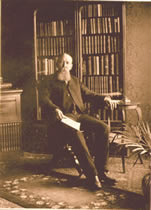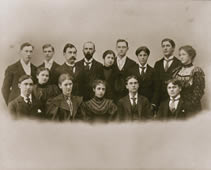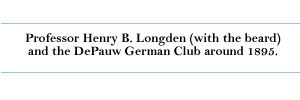
Pages:
<< Back 1
2 3 4
5 6 7
8 9 10
Next >>
Vice
President John Clark Ridpath, who had been one of those most responsible
for obtaining the assistance of W.C. DePauw and for planning the
reorganization of the university, resigned suddenly in 1885 at the
age of 45. Already the author of several textbooks, he gave up his
university post in order to devote himself fully to literary endeavors.
Working in his home on East Washington Street - now the site of Bittles
and Hurt Funeral Home - he set out upon a prolific publishing career
that made his name a household word in many parts of the country
and Greencastle a minor Hoosier literary center. Writing not for
a scholarly audience but for "the practical man of the shop,
counter, and the plow," he produced scores of volumes bearing
such titles as Popular History of the United States,
Cyclopaedia
of University History, and Great Races of Mankind. They were sold
by subscription in small towns and villages by travelling book agents
such as young Huey Long, who peddled them in rural Louisiana to
earn money for his education.

________________________________________________________
John
Clark Ridpath, professor at Indiana Asbury from 1869-85, taught
English literature, normal instruction, belles lettres, history and
political philosophy. He was vice president from 1879-85 and
was instrumental in acquiring the DePauw gift and making the plans
for the expanded university.
_________________________________________________
In 1896 Ridpath interrupted his literary labors briefly to run for
Congress from his home district on the Populist-Democratic fusion
ticket. Losing the election, he moved to Boston to edit a muckraking
journal, The Arena, and two years later went to New York to edit
the literary department of his publisher. He died there in 1900.
A contemporary journalist described the former DePauw professor
and administrator as not only a "popular historian ... but
also a profound thinker, a man of deep convictions, and a political
and social reformer of absolute courage."
One of Ridpath's former students, Jesse W. Weik, was a Greencastle
native who added to the literary luster of his hometown at this
time by gathering materials from Abraham Lincoln's onetime law partner,
William Herndon, and collaborating with him in publishing Herndon's
Lincoln in 1888. Written largely in Greencastle while Herndon was
visiting Weik in August 1887, the volume was the first to describe
in detail Lincoln's early life in Indiana and Illinois. After Herndon's
death Weik kept the manuscripts in his Greencastle home, where he
utilized them in several articles and another book on Lincoln and
made them available to Lincoln biographers such as his fellow Asbury
alumnus Albert J. Beveridge and Ida Tarbell.
Alexander Martin, whose presidential
term spanned the last decade of Indiana Asbury and the opening years
of DePauw University, resigned his administrative duties in 1889
but remained professor of mental and moral philosophy for another
five years. He had been a strong executive who had worked closely
with Washington C. DePauw in successfully effecting the transition
to the new, expanded university. But the times called for a different,
more modern type of leader.
The trustees chose as his successor Professor of Mathematics John
P.D. John, who had also been vice president since 1885. The first
member of the faculty to be elevated to the presidency, John was
immensely popular with students, as evidenced by a petition signed
by a majority of them and sent to the trustees urging his appointment.
Despite his lack of academic credentials - he had no earned degree
- he was a man of wide-ranging intellectual prowess. He was familiar
with the ideas of such educational reformers as Charles W. Eliot
of Harvard and Daniel C. Gilman of Johns Hopkins and had thought
deeply about the aims and methods of higher education. His relatively
short tenure as DePauw's president was to witness significant change
in the university's academic program as part of the general movement
that was transforming American colleges and universities of that
time from rather narrow, pedantic seminaries into more open, intellectually
freer institutions of learning.

President
John set forth his ideas in an inaugural address entitled "The
New Education," perhaps the most important ever delivered at
the university. Turning away from the rigidities of the prescribed
curriculum, he advocated a wider choice of elective studies to provide
"freedom for the pupil, freedom for the teacher, and freedom
in the subject." No iconoclast, John was not ready to abandon
completely the older emphasis on classical languages and mathematics;
instead he opted for broadening the variety of disciplines through
which students might experience the "process" of intellectual
growth.
The university had already begun to move cautiously in the direction
of electives, especially for students in their junior and senior
years. Now the movement was accelerated, culminating in a program
based on a core of basic requirements with the rest of the curriculum
more or less open to free choice. To provide greater intellectual
depth in particular fields, students were required to elect "majors"
and "minors" for the first time. Depending upon the choice
of major and of a classical or modern foreign language, graduates
were awarded the degree of bachelor of arts, bachelor of philosophy,
or bachelor of science. The bachelor of literature degree, which
accepted credits in music and art, was eliminated.
Back
to Top
Pages:
<< Back 1
2 3 4
5 6 7
8 9 10
Next >>
|



